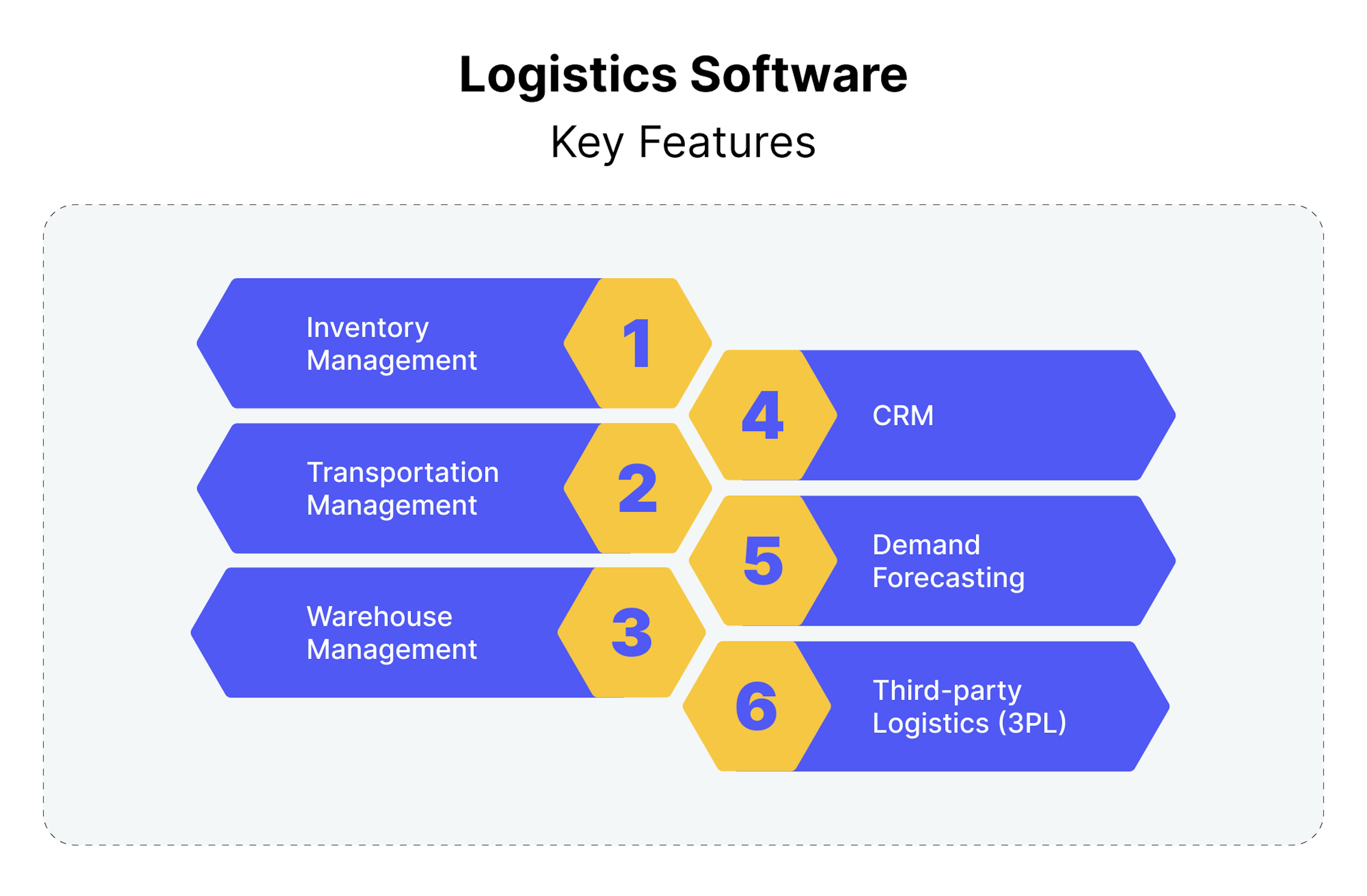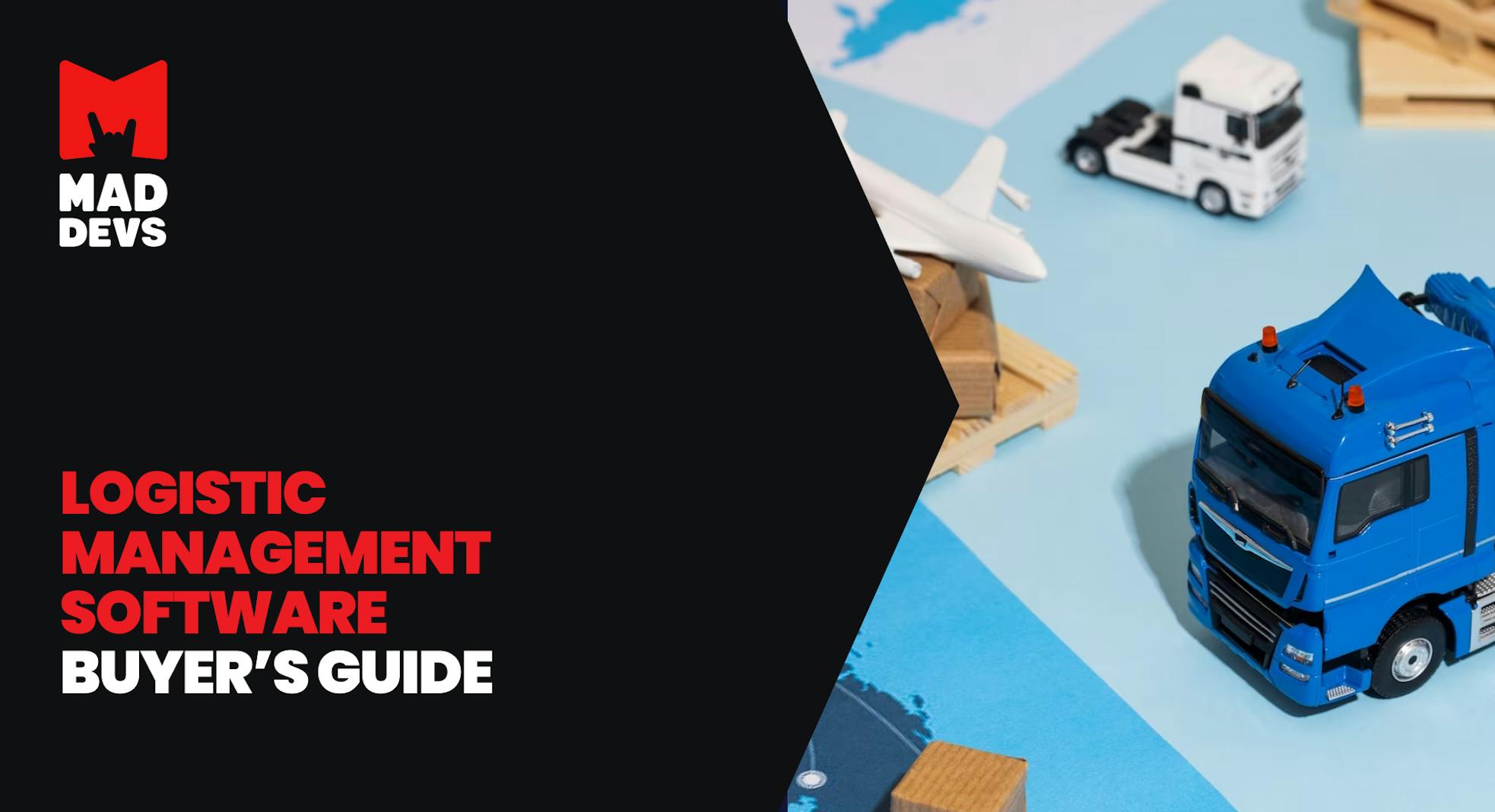Analyze with AI
Get AI-powered insights from this Mad Devs article:
Logistics management plays a pivotal role in ensuring the smooth flow of goods from suppliers to customers. To streamline these complex operations, organizations are turning to logistics management software.
The logistics industry would be a headache without recent advancements. In the past, you had to track your inventory and plan your delivery routes manually. Today, you can automate the pain and save hours of labor by using the right logistics management system.
This comprehensive guide will help you navigate the landscape of logistics software, outlining key considerations and features to make an informed decision.
What is logistic management software
The logistics software sector has evolved into a fundamental supply chain integration and coordination component. This shift happened because of proficient analytical dissection of customer satisfaction and the automation of logistical operations.
Logistics management strategically coordinates goods, services, and information movement within a supply chain to fulfill your customer needs. This entails efficiently managing transportation, warehouses, inventory, and order fulfillment. It also involves integrating logistics with other organizational functions to achieve broader business goals.
Logistics management software comprises a set of software tools aimed at enhancing end-to-end business processes. It improves order processing, inventory management, customer order delivery, and potential returns. Implementing a logistics management system offers advantages like prompt, precise customer service and elevated customer satisfaction. Additionally, it provides improved supply chain visibility, cost reduction, and the streamlining of logistics approaches.
What are the key features
There are many different features that software for logistics management can offer, depending on the specific business needs. Some key features include:

- Inventory management
With real-time sales data and historical trend analysis, you can track active orders and record shipments.
- Transportation management
It involves transporting finished products to customers from your warehouse. Your business might require choosing a suitable carrier or shipping service and planning your transportation route, including scheduling pickups, route optimization, and real-time shipment tracking.
- Warehouse management
Leverage IoT devices, sensors, and intelligent storage solutions to actively monitor your warehouse in real time. Enhanced visibility ensures constant awareness of your warehouse contents and their locations. Improved visibility leads to expedited shipping, efficient storage management, and accurate order fulfillment.
- CRM
Data-driven advertising and promotional campaigns that track leads and forecast demand.
- Demand forecasting
Demand planning tools assist in examining a product lifecycle and past sales records to recognize patterns and foresee future demand. Forecasting simplifies the process of strategizing inventory and supply adjustments in response to fluctuations in demand levels.
- Third-party logistics (3PL)
For numerous businesses operating across various geographical sites with multiple warehouses, managing transportation and shipping can become intricate. Opting to outsource logistics to dedicated third-party firms can offer convenience and cost-efficiency.
Logistics management software offers vital features for a seamless supply chain. From inventory and order tracking to transportation management, it optimizes operations, ensures customer satisfaction, and boosts competitiveness. Its comprehensive approach, including user control and system integration, exemplifies technology's transformative role in modern business.
🤝 Partner with us to create bespoke logistics software that caters to your unique needs. Streamline operations, boost productivity, and stay ahead of the competition. Reach out now to start your journey of tailored solutions.
What are the types of logistics management software
Software for logistics management encompasses various types designed to address specific supply chain management and operations aspects. Here are a few examples:
- Warehouse management system (WMS): Manages inventory, stock movement, storage, and order fulfillment within warehouses or distribution centers.
- Transportation management software (TMS): Focuses on optimizing transportation processes, route planning, carrier selection, and shipment tracking.
- Inventory management software: Primarily focuses on tracking inventory levels, replenishment, and inventory optimization.
- Fleet management software: This software helps businesses manage their fleets of vehicles, including tracking their location, fuel consumption, and maintenance needs.
- Supply chain management software (SCM): This software provides a holistic view of the supply chain, helping businesses optimize their operations across all stages of the process.
- Document management software: This software helps businesses store and manage their documents, such as invoices, shipping manifests, and packing lists.
- Route optimization software: This software helps businesses find the most efficient routes for their deliveries.
The specific type of logistics management software that is best for a particular business will depend on its needs and requirements. Some factors to consider are the size of the business, the complexity of operations, and the budget.
In addition to the above, there are also some other specialized types of logistics management software available, such as:
- Reverse logistics software: This software helps businesses manage the process of returning goods to suppliers or manufacturers.
- Compliance software: This software helps businesses comply with regulations related to logistics, such as those governing shipping and transportation.
If you are looking for logistics management software, it is important to research and select a solution that meets your specific needs. Many vendors offer logistics management software, so you should be able to find one that fits your budget and requirements.
Why you need to use logistic software
Logistic software offers numerous benefits that significantly enhance the efficiency, accuracy, and overall effectiveness of managing supply chain and transportation operations. Here are key reasons why using logistic software is essential:
Improved efficiency
Improved productivity is achieved through logistics management, which reduces inefficiencies and optimizes operations. Companies can cut expenses and enhance overall performance by collaborating with suppliers and carriers, tracking inventory, and optimizing transportation routes.
Enhanced customer support
Logistics management enhances customer service through on-time and precise deliveries. Businesses can furnish customers with current purchase details and guarantee prompt, satisfactory shipments by overseeing order processing and monitoring shipping progress.
Offers inventory traceability
Inventory traceability is ensured with logistics software, which identifies compromised items. You can detect defective items and swiftly remove them from orders. Historical data aids future sales forecasts, aligning stock with demand. Precise inventory management avoids overstocking or understocking, meeting your customer needs effectively.
Eliminates inventory inaccuracies
Manual inventory recording carries a risk of inaccuracies and duplicates. It is ineffective, time-consuming, and incapable of intricate tasks like auditing and real-time tracking. Automating data entry and tracking ensures precision, eliminating errors in inventory management.
Helps combat the wastage of resources
Through logistics software, companies can curtail resource wastage from inefficiencies, such as redundant staff scheduling, rushed shipments, chaotic item placement, and hasty transportation choices. These enhancements lead to cost reductions for the enterprise.
Resource optimization
Optimal resource allocation spans across warehousing, transportation, and labor. Efficient storage and strategic routes combined with smart scheduling enhance capacity, cut costs, and boost productivity. This dynamic approach fosters agility, sustainability, and competitiveness.
Sustainability
It is a paramount outcome of optimized logistics. By finely tuning operational strategies, companies effectively curtail fuel consumption and lower carbon emissions, significantly reducing their overall environmental impact. This concerted effort aligns operations with ecological concerns, exemplifying responsible corporate citizenship while contributing to a greener and more sustainable future for our planet.
Accurate forecasting
It relies on advanced analytics and historical data to predict demand trends. This empowers optimized production and procurement planning, leveraging insights from customer behavior and market dynamics for competitive advantage.
This table summarizes the different types of businesses that need software for logistics management, their needs, and the tools that can help them. The table is intended to help you to choose the right software for your needs.
| Buyer type | Needs | Tools |
|---|---|---|
| Small and medium-sized businesses (SMBs) | Small budget, limited resources | WMS with basic features such as inventory tracking, order management, and warehouse management. |
| Large enterprises | A large budget, complex needs | WMS with advanced features such as route planning, inventory management, and supply chain management. |
| 3PL providers | Provide warehousing and delivery services to other businesses. | WMS and TMS |
| Manufacturing businesses | Produce and store goods | WMS and TMS |
| Retail businesses | Sell goods to consumers | WMS and TMS |
| E-commerce businesses | Sell goods to consumers online | WMS and TMS |
How to choose LMS software
Logistics management software can transform how organizations track shipments, manage inventory, and optimize operations. There are several logistics software options on the market, so choosing the one that aligns perfectly with your business needs is important. Here, we'll delve into the essentials to consider when selecting logistics software.
Identify your needs. Before selecting software for logistics management, identify your specific needs and requirements. Consider factors such as the size of your business, the complexity of your supply chain, and the type of products you handle.
Consider scalability and customization options. Make sure the software can scale with your business and can be customized to meet your specific needs.
Check for integration with other systems. Ensure that the software can integrate with other systems to streamline operations and improve efficiency.
Evaluate the user interface. Consider that the software offers a user-friendly interface.
Look for real-time visibility and tracking. Make sure the software provides real-time visibility into the supply chain, allowing you to track shipments and monitor inventory levels.
Check for analytics and reporting capabilities. Ensure that the software provides analytics and reporting capabilities, allowing you to monitor performance and identify areas for improvement.
Consider the cost and return on investment. Evaluate the cost of the software and its potential return on investment. Consider factors such as the time and cost savings it can provide and its impact on your bottom line. Do not forget to calculate the cost of employee training.
Consider access levels. Please note that when choosing any software, you must pay attention to security. Please note that different employees should have different access levels to certain parts of reports, documentation, and functionality.
Logistics management software enhances supply chain efficiency. Choose wisely from various options to empower operations and grow your business. You can immediately go to this part if you have not yet decided whether you need a ready-made solution or a custom one. Also, you can explore some takeaways from our team, which may help you to make the choice.
Our team was involved in developing a TMS to optimize logistics companies' operations, including monitoring work processes (cargo creation, transportation, accounting matters, document flow) and employee and time tracking. Previously, everything in the customer's company was managed through Google Sheets and Docs, so information was spread across, making the work difficult.
After consulting with the customer, we identified the following requirements for the future software:
- Centralization of documentation
- Automation of work processes
- Independence from ready-made solutions.
Before approaching us, the customer had already used various TMS solutions, but they needed to be a better fit. Among them, one stood out as some of its functionality aligned with their requirements. However, since the TMS was designed for the founders' system, it needed to align with our customer's business processes. It was impossible to adjust or add anything to meet their needs.
As a result, the customer came to us to create their own system, where the foundational business processes from the previous TMS would serve as the basis. These processes would be complemented by tailored solutions and features to meet their specific needs.
To start, we conducted a discovery phase in which we identified the pain points, essential business functionalities, software requirements, and more. Then, we formulated an MVP, a minimum viable product, based on the results. This phase took approximately 2.5 months. Subsequently, an entire year was dedicated to the software development process.
During this time, we developed a fully functional software solution, which is currently undergoing utilization and testing by the client. Our team is providing ongoing support, stabilizing the system, and processing feedback from the customer.
Precisely for this project, our development team achieved the following:
- Managed to save a portion of the budget and time on front-end development and UI/UX designers by handling these tasks in-house.
- Implemented complex and extensive architectural solutions due to the integration of various types (Samsara, GPS tracking system, maps, driver route control system, fuel integration, transaction history, etc.).
- Integrated ELD (Electronic Logging Device) for monitoring driver workflow.
- Additionally developed a mobile application, which is soon to be released on Google Play & App Store.
If you are interested in this project and would like to develop your own, view our transportation software solutions. Contact us by filling out the form if you have questions or cooperation proposals.
What are the popular logistics management software
Exploring the realm of efficient logistics management, here we will highlight the main features of popular logistics software solutions. Software options like these optimize processes, improve visibility, and elevate overall logistics performance in a world where streamlined supply chains drive operational success.
| Software | Trial | Price | Industry focus | Size focus | Deployment type |
|---|---|---|---|---|---|
| Fishbowl | 14 days free trial | Starting at $349 per month. | Manufacturing industry | Small to medium | On-premise |
| Alvys | None | Starts at $150 per month. | Trucking and logistics industry | Small to medium | Cloud |
| Excalibur WMS | None | Approximately starting price of $250.00 per month or $300.00 per user license. | Third-party logistics (3PL), public warehouses, and packaging fulfillment operations | Small to enterprise | Cloud |
| Logiwa WMS | None | Approximately $300.00, request demo to learn more | E-commerce, retail, wholesale, and fulfillment center | Small to enterprise | Cloud |
| Zoho Inventory | Free trial and free version | Starting from $79.00 per month. | E-commerce, retail, manufacturing, and distribution. | Small to enterprise | Cloud |
Fishbowl

Fishbowl is an ERP software solution that helps businesses manage their inventory, order fulfillment, and shipping processes. It also streamlines logistics operations by improving efficiency and reducing costs.
One of Fishbowl's major perks is how it integrates with other logistics systems, such as your WMS or TMS, to improve your entire supply chain process. It helps organize and manage your accounting, HR, and CRM platforms.
You can see your inventory, orders, and shipping logistics all in one place with Fishbowl. You can also manage orders from multiple sales channels, like eCommerce platforms and point-of-sale (POS) systems.
Best for: Manufacturing, engineering, and distribution sectors
Key features
- It enables real-time inventory tracking, reorder alerts, and multi-location support, enhancing efficient inventory management.
- Fishbowl streamlines order management by enabling quote creation, order tracking, and seamless integration with e-commerce platforms like Shopify and Amazon.
- It automates warehouse tasks like picking, packing, and shipping, supporting barcode scanning and RFID tracking for accurate inventory management.
- Fishbowl syncs with software like QuickBooks, Salesforce, and Microsoft Dynamics, streamlining data sharing and boosting efficiency.
- Offers customizable reports to track inventory, orders, and warehouse activities for tailored insights.
Alternatives: Sortly, InventoryCloud, QuickBooks
Alvys

Alvys provides a cloud-based TMS system as a SaaS solution, offering comprehensive visibility into shipments and automated features for invoicing, procurement, optimization, planning, and task management. Additionally, it has a mobile app for drivers to handle administrative tasks efficiently.
Alvys assists in payment management and tax calculations by automatically syncing all features with accounting operations. This software particularly suits sizable trucking businesses, emphasizing productivity, and efficiency.
Best for: Trucking and transportation, logistics and supply chain, and middle-mile logistics sectors
Key features
- Alvys aids trucking firms in end-to-end load management. Create, track loads, and integrate with freight platforms for load acquisition.
- It streamlines carrier management: profile creation, performance tracking, and invoice generation. Integration with rating platforms for rate comparison.
- For trucking firms, financial management becomes simpler. Users monitor fuel, maintenance, and other costs, while generated reports aid in tracking financial performance.
- This tool seamlessly connects with various business software like QuickBooks, Salesforce, and Google Maps, enabling trucking companies to share data across systems, enhancing time-saving and efficiency.
Alternatives: Motive, GroundCloud, MyCarrierTMS
Excalibur WMS

Excalibur WMS is a warehouse management software created by Camelot 3PL, designed to optimize third-party logistics (3PL), public warehouses, and packaging fulfillment tasks. It offers centralized control over inventory, shipping, receiving, invoicing, and reporting, simplifying operations.
Best for: 3PL, distribution and supply chain, logistics, and freight forwarding sectors
Key features
- Excalibur WMS provides visibility into client inventories, increasing accuracy and productivity.
- It supports retail EDI compliance and other industry-specific compliance requirements.
- Excalibur WMS enables analysts to add a common type of raster imagery.
- It can be deployed as a cloud-based or on-premise solution.
- Excalibur WMS is fully automated and designed explicitly for the third-party logistics industry.
Alternatives: Pirate Ship, AutoDS, Cin7 Core
Logiwa WMS

Logiwa WMS is a cloud-based warehouse management software designed for high-volume fulfillment. It is an integrated system that provides order fulfillment functionality, and inventory and warehouse management. Logiwa WMS is used by companies and third-party logistics providers (3PLs) in various industries, including retail, e-commerce, wholesale, and more. It offers features such as barcoding/serial tracking, billing, and third-party plugins.
Best for: Wholesale businesses, business-to-consumer (B2C) or direct-to-consumer (DTC), and business-to-business (B2B)
Key features
- Logiwa WMS offers advanced inventory management for multi-warehouse operations.
- It provides mobile order tracking and fulfillment capabilities.
- Logiwa WMS is a paperless system that uses barcode scanning for increased efficiency and accuracy.
- It offers unlimited integrations and APIs for seamless connectivity with other systems.
- Logiwa WMS is designed for retail and e-commerce businesses and offers features tailored to this industry.
- It has directed putaway features and AI-powered capabilities that optimize warehouse operations.
- It offers billing functionality to help manage financial transactions related to warehouse operations.
Alternatives: Cin7 Omni, Infoplus, Orderhive
Zoho Inventory

Zoho Inventory is a cloud-based inventory management software designed for businesses of all sizes. It offers inventory, order, purchase, and shipping management features. With Zoho Inventory, businesses can keep track of their inventory levels, sales orders, and purchase orders in real time. It also offers integrations with other Zoho products as well as third-party applications. Zoho Inventory is available for businesses worldwide and is designed to be user-friendly and accessible on desktop and mobile devices.
Best for: Manufacturing, logistics, supply chain, and 3PL sectors
Key features
- Zoho Inventory offers a complete range of inventory management features, including item management, customer lifecycle, vendor relations, integrations, automation, and smart features.
- It offers world-class order management capabilities, including end-to-end tracking, real-time shipping rates, and integrations with other systems.
- Zoho Inventory helps create and track the inventory (stock flow) of items and item groups, grouping items, and composite items — kitting, or bundling of products.
- It offers warehouse management features to oversee products at your warehouses, including conditions for importing product data from Zoho Inventory.
- Zoho Inventory allows for tracking every item or batch in your inventory with serial number and batch tracking feature.
- Zoho Inventory has reporting capabilities to help businesses gain insights into their inventory and sales data.
Alternatives: Webgility, inFlow Inventory, Multiorders
What to choose a ready-made solution or custom development
When it comes to choosing between a ready-made solution or custom development for logistic management software, there are pros and cons to consider.
Pros and cons of ready-made logistics solutions
In the realm of logistics software, business owners often grapple with the decision of adopting off-the-shelf solutions or investing in custom systems. Each choice comes with its own set of distinct advantages and disadvantages.
Opting for ready-made logistics software presents several notable benefits:
- Continuous updates, provided by developers, grant businesses access to evolving features.
- The cost of software development is already covered, making it budget-friendly.
- Compatibility with various business processes and ease of implementation are key advantages.
- Predefined features cater to a wide range of industries.
However, there are drawbacks to ready-made solutions:
- Customization options are limited as software features are pre-designed by the development company. New features typically arrive through updates.
- Security concerns can arise, as these solutions may lack the highest level of protection.
- Customer support may be restricted, potentially leading to delayed problem resolution.
When navigating the choice between these options, business owners must carefully weigh the benefits and drawbacks to align their software strategy with their unique operational needs.
Pros and cons of custom-built logistics software
When a business demands specific features, custom logistics software emerges as the ideal solution. Here are the key advantages of such tailored solutions:
- Providers consider your unique requirements and create solutions tailored to your specific business needs.
- Custom software is adaptable, allowing business owners to expand available features based on current requirements.
- Entrepreneurs have complete control over the source code, enabling upgrades or even potential resale.
- You receive a personalized design and functionality solution that aligns perfectly with your expectations. Additionally, business owners maintain oversight throughout the development stages.
- The utmost level of security is assured, as custom-built software solutions offer enhanced protection against breaches.
However, there are certain drawbacks to custom logistics software:
- Off-the-shelf solutions are more budget-friendly, whereas the expense of custom software is relatively higher due to specific requirements.
- Developing custom systems necessitates a longer timeframe, often involving significant engagement from business owners.
- Ongoing support and maintenance from skilled developers are vital to ensure the software's smooth operation and address any issues.
One approach that balances these factors is the Build-Operate-Transfer model. This model allows businesses to hire, train, and eventually transfer skilled developers to their team. It provides long-term support while aligning the software's development with the business's goals and objectives.
While these drawbacks may seem significant, they are balanced by the benefits of a tailor-made solution that can drive efficient operations and future growth. The investment in a high-quality software proves invaluable in the long-term trajectory of your business.
It is difficult to provide a specific cost for an annual subscription to out-of-the-box logistics management tools or custom development with support, as it depends on various factors, such as the functionality and complexity of the software, developer rates, and the location of the development team. You can contact our expert Tony for a free 30-minute consultation if you need custom development.
What are the future trends and predictions
In light of the ever-evolving terrain of logistics, we need to explore the trends and predictions poised to revolutionize the industry.
Various factors, including technological advancements and changing your customer needs, influence global logistics' future. The following trends can be expected in 2023 and beyond:
Artificial and augmented intelligence
AI integration in logistics (transport, planning, demand forecast) is reshaping. Augmented intelligence, merging human skills with tech, emerges in warehouse management, boosting efficiency.
One of the best examples is warehouse management, which optimizes the distribution and storage of diverse goods. Towards third-generation business intelligence, smart industry systems will have stunning cognitive abilities to display detailed instructions of the work plan with detailed operational instructions. This transformation will help in reducing the lead time and training period.
Research predicts that by the end of 2023, Augmented Intelligence could add $2.9 trillion in business value and boost global worker productivity by 6.2 billion hours, prompting increased AI adoption for enhanced accuracy and efficiency.
Warehouse robotics
In 2012, logistics witnessed a transformative shift with the adoption of robotics in warehouse operations. Amazon made a big investment to improve productivity in the supply chain by acquiring a robotics company called Kiva. Today, they have more than 520,000 robotic drive units, adding over a million jobs worldwide. This trend is set to continue as robotics reduces errors and ensures worker safety by performing risky tasks. Enhanced delivery speed and efficiency due to automation contribute to customer satisfaction and brand growth, making warehouse robotics a prominent trend for the foreseeable future. This year, the Warehouse Robotics Market is being valued at USD 12.93 billion, and by 2028, the market is expected to reach USD 24.92 billion, growing at a CAGR of 14.02%.
Electronic freight evolution
According to a report by Grand View Research, the global electronic freight evolution in logistics management software market size is expected to reach USD 22.7 billion by 2028, from USD 11.3 billion in 2021, at a CAGR of 11.3% during the forecast period. Electronic freight, or e-freight, refers to the digitization and automation of the freight forwarding and logistics processes. It involves the use of electronic documentation, digital communication, and data exchange to streamline and enhance the efficiency of freight transportation. Technology is revolutionizing air logistics through paperless air cargo transportation. The introduction of digital invoicing, freight tracking software, and other innovations aims to reduce paper use and carbon emissions in the air cargo industry. This shift toward a paperless future enhances efficiency while aligning with sustainability goals.
Blockchain
Blockchain will find applications in logistics management software, enhancing transparency, security, and trust in supply chain transactions. It can enable secure and immutable record-keeping, automate smart contracts, and facilitate supply chain traceability and provenance verification. According to the research firm International Data Corporation (IDC), global blockchain spending in logistics management software will reach nearly $17.9 billion in 2024. This represents a compound annual growth rate (CAGR) of 82.4% from 2021 to 2024.
5G & Internet of Things
IoT devices and sensors powered by 5G, will mainstream real-time fleet monitoring. This includes tracking driving conditions, routes, temperatures, and assets, bringing cost savings, reduced delays, and heightened safety. Cold chain management, highlighted during the pandemic, becomes crucial — like transporting vaccines at -70°C degrees. Supply chain transportation can be closely monitored, with real-time updates to businesses and regulators at the origin. In 2022, the global market for 5G and IoT in logistics management software was valued at $12.8 billion and is expected to reach $39.6 billion by 2027, growing at a CAGR of 17.2%.
Market segmentation and regional analysis
The global logistic software market has been segmented based on software type and end users. The software types include warehouse, labor, transportation, and data management. The end users include retail and e-commerce, manufacturing, healthcare, automotive, and others. The APAC region is expected to lead the global logistic software market over the forecast period.
Market size and growth
According to market research reports, the global logistic software market was valued at USD 18.31 billion in 2023 and is expected to grow at a CAGR of 11.37% during the forecast period. The Global Logistic Software Market Research Report- Forecast 2032 suggests that the logistics software market is estimated to grow at a CAGR of 8.31% from 2023 to 2032. The warehouse management segment accounted for the largest revenue share in 2022, and this segment is expected to continue to grow due to the time savings, increased productivity, and efficiency it provides.
Bottom line
Logistics software is indispensable for efficiency and competitiveness in the dynamic business landscape. Choose software based on needs and budget, whether off-the-shelf or custom-built, to unlock streamlined operations.
We're here to help you navigate this transformative journey and maximize the benefits of logistics software for your business.










